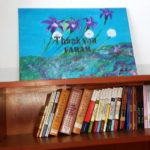Palestine Laptops Project
Our laptops project is far more about education than it is about laptops. We are buying ‘One Laptop Per Child’ ruggedised, mechanically or solar powered educational laptops for Palestinian children in the West Bank and Gaza and in refugee camps in the Middle East as a tool to help them get a better education.
One of the most insidious aspects of the occupation that the children in the West Bank and Gaza are living under is that the policies adopted by the Israeli occupation forces are systematically eliminating hope or belief in a peaceful and sustainable future. The barriers on movement imposed as a daily punishment on the children and their parents often means that access to their local schools is denied. In addition, the schools are often summarily closed down by the Israeli authorities without explanation. As a result, the children are deprived of an education that would create hope for a future in which they can be active participants and creators. We want to help provide these children with an education that opens possibilities for a future that they can believe in and want to live for.
Our laptop project is about buying educational laptops for schools and community groups with responsibility for children. One village we have our eye on has actually organised computer training for its students, where all the training is theoretical as there is nothing with a microprocessor in it in sight! This includes training on the internet on paper! We are investingating a variety of laptops suitable for educational purposes, with the One Laptop per Child laptops being current favourites at $199 a pop.
Why Laptops?
Although we will also be buying more basic school materials such as books and pens, we are keen on using these laptops as well because:
-
We want the versatility to cover many subjects within a single portable tool. Children in Gaza and the West Bank are often prevented from going to school either by roadblocks or school closures, so it is important that they can have variety and the ability to work with new topics whether at home or at school. This should include being able to work on new materials so as to minimise disruption to new learning.
-
We believe that children should be active participants and creators within their own educational process. This is more easily achieved with tools allowing them to experiment, undo, redo, and be creative in their thought processes in a way that a book and paper alone may not allow.
-
We want to encourage children to enhance their learning and creative processes with tools that foster thinking for themselves but which also encourage collaboration. Networked laptops enrich the educational experience through collaboration, and allows children to be able to easily share and build on each other’s work.
- Finally, it is inconceivable in most developed and rapidly developing economies to think of a successful economic environment which operates in isolation of information technology. We would like children in the West Bank and Gaza to grow up entirely at ease with the evolving technologies, rather than in isolation of the revolutions that are driving much of the progress in the rest of the world.






Leave a Reply